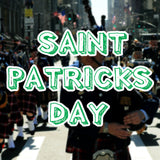History of St. Patrick’s Day

History of St. Patrick’s Day
You may be surprised to know that there is more to St. Patrick’s day than drinking green beer and Shamrock shakes from McDonalds. There is actually a reason why we celebrate it and not just to head to the bar far too early than what is usually deemed appropriate.
St. Patrick’s Day was named after the Saint Patrick who was the patron saint of Ireland. Though, you may be surprised to learn that he was not born in Irish. It is said that he his birth place was most likely in Scotland or Roman England and his real name was Maewyn Succant. His Romanicized name was Patricius which he later became known simply as Patrick.
He had a fairly normal childhood, being born to a Roman-British army officer. But one day a band of pirates came and kidnapped him, along with many others forcing them into slavery in Ireland. He was imprisoned for 6 years until one day he said he received a message of God. Specifically an escape plan from him… complete with a ship.
With his instructions from God, he escaped to Britain and then moved to France where he joined the monastery. It was there that he studied under St. Germain, the bishop of Auxerre. His training was 12 years. It was then he felt the call of God again, telling him to go back to Ireland and spread the word about God. With the Pope’s blessing, he made his journey and happened to be very successful at actively preaching and converting many people, even some from the royal family. This upset the Celtic Druids, which resulted in him getting arrested multiple times but with his obvious ninja like skills, escaped every time.
There are a few legends that are associated with St. Patrick. It is said that he would use the three leafed Shamrock to explain the concept of the Holy Trinity. It is also said that he put the curse of God on all Irelands venomous snacks driving them into the sea where they drowned. His mission lasted for over 20 years and the day that he died, March 17th, has been commemorated as St. Patrick’s Day where they view this day as the universal baptization of Ireland. Over time, St. Patrick’s Day became more of a secular holiday of a celebration of everything Irish. It is celebrated not only in Ireland but now all over the world.
